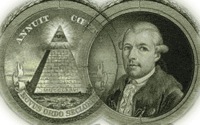Illuminati
From Nordan Symposia
Jump to navigationJump to searchOrigin
Plural of Latin illūminātus , Italian -ato ‘enlightened’
Definitions
- 1: With pl. concord. A name assumed by or applied to various societies or sects because of their claim to special enlightenment in religious, or (later) intellectual, matters.
- a. Applied to a sect of Spanish heretics which existed in the 16th c. under the name Alumbrados or ‘enlightened’; subsequently, to a similar but obscure sect of Familists which arose in France in Louis XIII's reign
- b. b. Used to render German Illuminaten, the name of a celebrated secret society, founded at Ingolstadt in Bavaria, in 1776, by Professor Adam Weishaupt, holding deistic and republican principles, and having an organization akin to freemasonry; hence applied to other thinkers regarded as atheistic or free-thinking, e.g. the French Encyclopædists.
Description
The Illuminati (plural of Latin illuminatus, "enlightened") is a name given to several groups, both real (historical) and fictitious. Historically the name refers to the Bavarian Illuminati, an Enlightenment-era secret society founded on May 1, 1776. In more modern contexts the name refers to a purported conspiratorial organization which is alleged to mastermind events and control world affairs through governments and corporations to establish a New World Order. In this context the Illuminati are usually represented as a modern version or continuation of the Bavarian Illuminati.[1]
